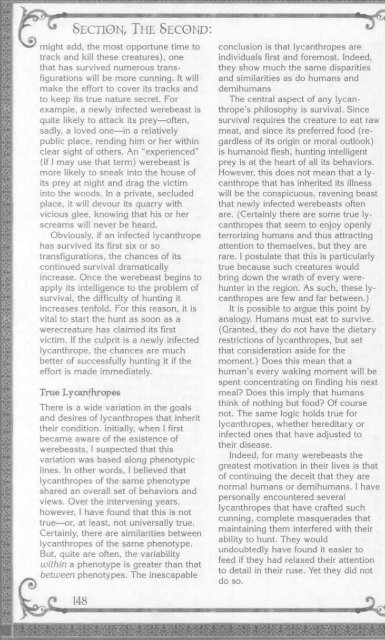Van Richten's Monster Hunter's.pdf - Askadesign.com
Van Richten's Monster Hunter's.pdf - Askadesign.com
Van Richten's Monster Hunter's.pdf - Askadesign.com
Create successful ePaper yourself
Turn your PDF publications into a flip-book with our unique Google optimized e-Paper software.
might add, the most opportune time to<br />
track and kill these creatures), one<br />
that has survived numerous transfigurations<br />
will be more cunning. It will<br />
make the effort to cover its tracks and<br />
to keep its true nature secret. For<br />
example, a newly infected werebeast is<br />
quite likely to attack its prey-often,<br />
sadly, a loved one-in a relatively<br />
public place, rending him or her within<br />
clear sight of others. An “experienced”<br />
(if I may use that term) werebeast is<br />
more likely to sneak into the house of<br />
its prey at night and drag the victim<br />
into the woods. In a private, secluded<br />
place, it will devour its quarry with<br />
vicious glee, knowing that his or her<br />
screams will never be heard.<br />
Obviously, if an infected lycanthrope<br />
has survived its first six or so<br />
transfigurations, the chances of its<br />
continued survival dramatically<br />
increase. Once the werebeast begins to<br />
apply its intelligence to the problem of<br />
survival, the difficulty of hunting it<br />
increases tenfold. For this reason, it is<br />
vital to start the hunt as soon as a<br />
werecreature has claimed its first<br />
victim. If the culprit is a newly infected<br />
lycanthrope, the chances are much<br />
better of successfully hunting it if the<br />
effort is made immediately.<br />
True Lycanthm-<br />
There is a wide variation in the goals<br />
and desires of lycanthropes that inherit<br />
their condition. Initially, when I first<br />
became aware of the existence of<br />
werebeasts, I suspected that this<br />
variation was based along phenotypic<br />
lines. In other words, I believed that<br />
lycanthropes of the same phenotype<br />
shared an overall set of behaviors and<br />
views. Over the intervening years,<br />
however, I have found that this is not<br />
true-or, at least, not universally true.<br />
Certainly, there are similarities between<br />
lycanthropes of the same phenotype.<br />
But, quite are often, the variability<br />
within a phenotype is greater than that<br />
between phenotypes. The inescapable<br />
conclusion is that lycanthropes are<br />
individuals first and foremost. Indeed,<br />
they show much the same disparities<br />
and similarities as do humans and<br />
demihumans<br />
The central aspect of any lycan-<br />
thrope’s philosophy is survival. Since<br />
survival requires the creature to eat raw<br />
meat, and since its preferred food (re-<br />
gardless of its origin or moral outlook)<br />
is humanoid flesh, hunting intelligent<br />
prey is at the heart of all its behaviors.<br />
However, this does not mean that a ly-<br />
canthrope that has inherited its illness<br />
will be the conspicuous, ravening beast<br />
that newly infected werebeasts often<br />
are. (Certainly there are some true ly-<br />
canthropes that seem to enjoy openly<br />
terrorizing humans and thus attracting<br />
attention to themselves, but they are<br />
rare. I postulate that this is particularly<br />
true because such creatures would<br />
bring down the wrath of every were-<br />
hunter in the region. As such, these ly-<br />
canthropes are few and far between.)<br />
It is possible to argue this point by<br />
analogy. Humans must eat to survive.<br />
(Granted, they do not have the dietary<br />
restrictions of lycanthropes, but set<br />
that consideration aside for the<br />
moment.) Does this mean that a<br />
human’s every waking moment will be<br />
spent concentrating on finding his next<br />
meal? Does this imply that humans<br />
think of nothing but food? Of course<br />
not. The same logic holds true for<br />
lycanthropes, whether hereditary or<br />
infected ones that have adjusted to<br />
their disease.<br />
Indeed, for many werebeasts the<br />
greatest motivation in their lives is that<br />
of continuing the deceit that they are<br />
normal humans or demihumans. I have<br />
personally encountered several<br />
lycanthropes that have crafted such<br />
cunning, <strong>com</strong>plete masquerades that<br />
maintaining them interfered with their<br />
ability to hunt. They would<br />
undoubtedly have found it easier to<br />
feed if they had relaxed their attention<br />
to detail in their ruse. Yet they did not<br />
do so.


